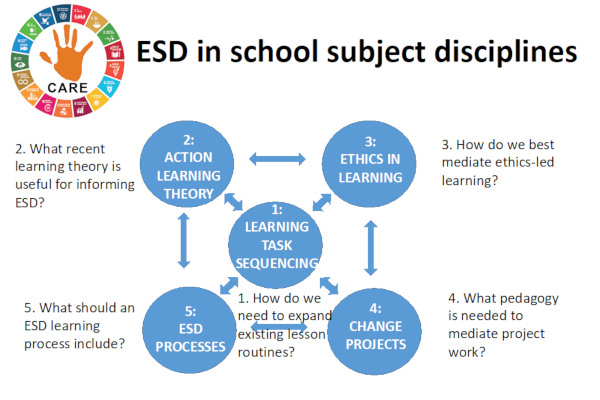The Knowledges Commons
Knowledge Commons Project
A Knowledge Commons at the Environmental Learning Research Centre provides a space for social innovation, engaging the border zones between the academy, public sector and civil society; between the academy, public sector and civil society; between theory and practice; and knowledge, learning and human agency. A diversity of Knowledge Commons Projects operate at any one time, involving collectives of people who experiment, innovative, monitor and report on key features of sustainability practices and social learning in different social-ecological contexts, using a diversity of media.
Knowledge Commons Activities include, amongst others, creative practices, citizen sciences, productive demonstration site development, learning network development, youth leadership for environment and sustainability and more. These activities infuse various environmental learning programmes focussing on water, food security, climate change, biodiversity, energy, waste as well as the nexus between these concerns, social justice and human well being.
Partnerships & Engagement Exchange
The Environmental Learning Centre and its Knowledge Commons projects work with a partnership approach. They are connected with a range of partners at local, national and international levels in a ‘chain’ of networking learning interactions. Partners range from the local Makana Municipality (a key partner in the initiative) and local NGOs to national government departments and international organisations involved in environment and sustainability education such as UNESCO, UNEP and UNDP. The Centre houses the United Nations linked Makana and Rural Eastern Cape Regional Centre Expertise (RCE) in Education for Sustainable Development.
The Rhodes University Environmental Learning Research Centre and Knowledge Commons are committed to promoting quality, relevant education, accessible to all in equal measure.
Vision & Goals
Facilitate critical and innovative environmental learning and related research for just, resilient societies and sustainable environments in Africa and the global South through:
• Producing credible new knowledge of education, training and social learning practices that focus on African social-ecological contexts and issues.
• Providing tailored educational products and services to enhance educational quality and innovation in Africa and the global South.
• Strengthening and contributing to durable knowledge institutions and networks in Africa that
promote education for social-ecological resilience and sustainability.
• Promoting and disseminating quality knowledge products by African scholars and practitioners
on environment and sustainability education and learning.
• Undertaking focussed advocacy with influential public and developmental agencies.
Research Centre
The Environmental Learning Research Centre produces state of the art knowledge on environment and sustainability education, training and social learning. It promotes encourages social scientific methodological innovation to produce knowledge of the African education and social-ecological context. Research and teaching are interlinked. Research programmes have local, national and international reach and relevance.
The Research Centre houses two research chairs: An National Research Foundation and Department of Science and Technology Tier 1 Chair in Global Change and Social Learning Systems, and a Rhodes University Chair in Environment and Sustainability Education. The two research chairs co-ordinate research programmes working along these themes: transformative social learning and green skills learning pathways; green work and learning for just transitions; evaluation and ethics led-learning; professional learning for educational quality and relevance. Overall the research programmes all contribute knowledge to education system change for just transitions towards sustainability.
These programmes attract researchers from all educational sub-sectors, including schools, universities, colleges, adult education, industrial training, public and community education; as well as from the sciences, arts and social sciences. The focus is on the people-environment-learning interface in a variety of sectors. The research programmes include research at Honours, Masters and PhD levels, and the ELRC hosts approximately 40 post-graduates at any one time, making this a vibrant research community.
Teaching & Capacity Building
The Environmental Learning Research Centre, located in the Department and Faculty of Education at Rhodes University, offers a number of teaching and capacity building programmes that are closely aligned to its research programme. These include:
• PHD (Environment and Sustainability Education)
• Masters in Education (Environment and Sustainability Education)
• Environment and Sustainability Education specialism in education degree courses such as the Bachelor of Education and the Bachelor of Education (Honours)
• A range of Environment and Sustainability Education Short Courses that are oriented towards Changing Practice in diverse settings

Rob O’Donoghue has prepared two short videos on learning and ESD.
The first videos reflect ‘Changing Learning and Training Environments,’ a chapter in the recent UNESCO book on ‘Issues and Trends in ESD.’ The video is in 2 parts:
- ESD learning theory with case study exemplars
- An overview of common theory and some recent process perspectives
The two videos should be used with the Chapter 5 text and are accompanied by introductory references/readings on some of the more widely used learning theory.
The second series is a 5 part set of Hand-Print CARE videos on learning theory for classroom contexts of teaching and learning. The introduction (A0) provides an overview and Parts 1-5 (A1-A5) provide theory and starting points to expand existing Teach-Task-Test learning sequences in school subject disciplines so as to include ESD as learner-led inquiry and change challenges.
Last Modified: Mon, 13 May 2019 10:12:45 SAST
